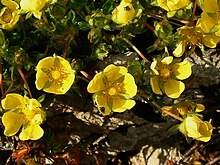Potentilla pusilla
| Potentilla pusilla | |
|---|---|

| |
| Scientific classification | |
| Kingdom: | Plantae |
| Clade: | Tracheophytes |
| Clade: | Angiosperms |
| Clade: | Eudicots |
| Clade: | Rosids |
| Order: | Rosales |
| Family: | Rosaceae |
| Genus: | Potentilla |
| Species: | P. pusilla |
| Binomial name | |
| Potentilla pusilla Host | |
| Synonyms | |
List
| |
Potentilla pusilla, the spring cinquefoil or spotted cinquefoil, is a perennial species of flowering plant in the rose family (Rosaceae).[1] It may grow up to the height of 5–15 cm (2-6 in).
It was first scientifically described by H.G.L. Reichenbach in 1832. P.F.A. Ascherson later called it P. tabernaemontani, a name which is now invalid. The name P. verna was misapplied to this species; as originally described by Linnaeus, it actually refers to the alpine cinquefoil (P. crantzii). This is a fairly nondescript species of cinquefoil. Its typical five-fingered leaves and — in early spring — five-petalled yellow flowers are borne on low-lying stems. As its common name implies, in most of its range it is one of the first cinquefoils to bloom. It can grow in dry, marginal habitat, such as roadsides, dry meadows, and talus.[2] Thus it can be used for rock gardens, providing bright bunches of yellow when few other plants are blooming.
References
- ^ "Potentilla pusilla Host | Plants of the World Online | Kew Science". Plants of the World Online. Retrieved 2024-06-09.
- ^ "Potentilla neumanniana | Online Atlas of the British and Irish Flora". plantatlas.brc.ac.uk. Retrieved 2022-12-04.
External links
 Media related to Potentilla neumanniana at Wikimedia Commons
Media related to Potentilla neumanniana at Wikimedia Commons Data related to Potentilla pusilla at Wikispecies
Data related to Potentilla pusilla at Wikispecies
